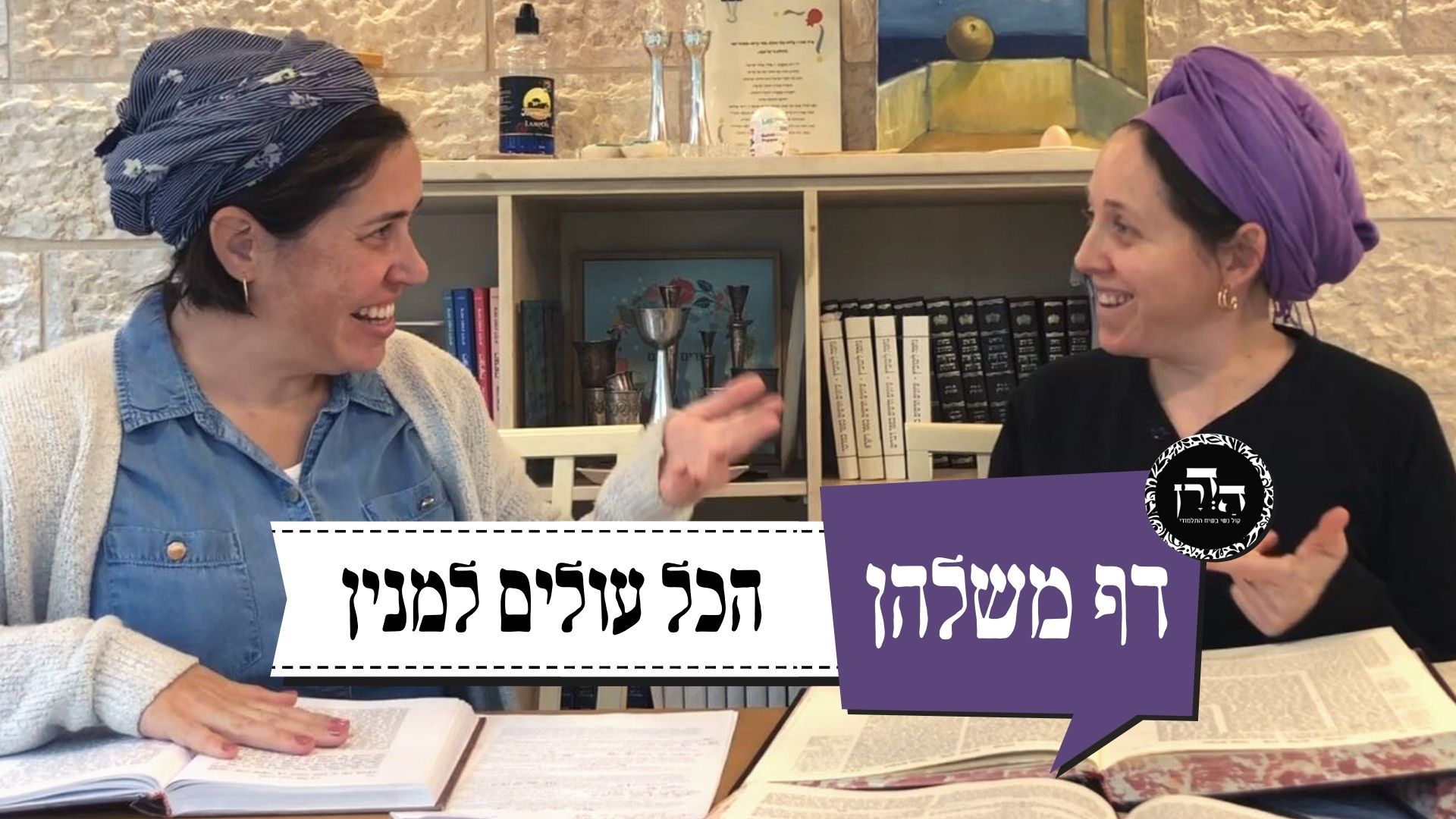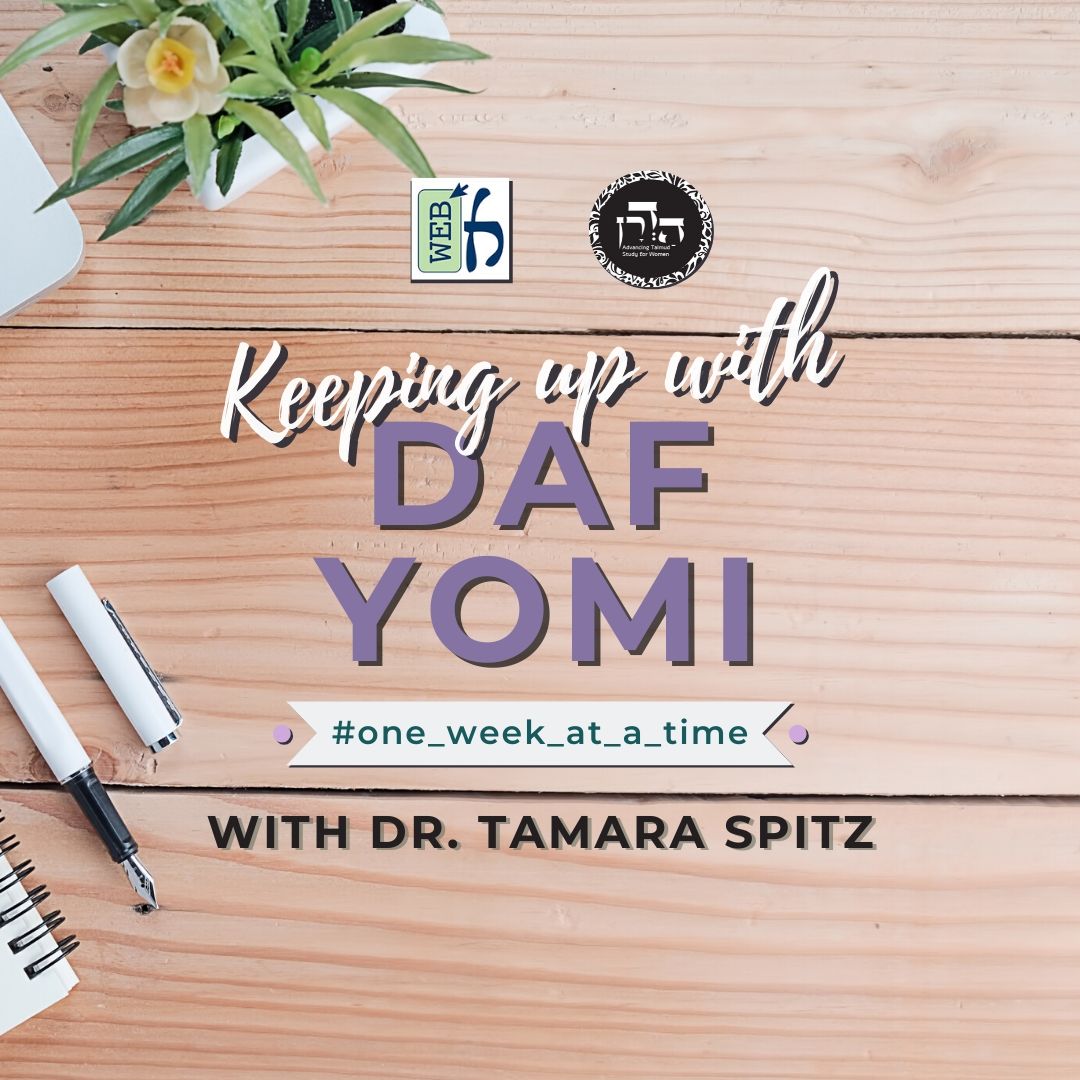המשנה עורכת השוואה בין האשה שצריכה להביא המון גוזלות בגלל הבלבולים לבין איל שבחיים השמיע רק קול אחד ובמיתתו אפשר לעשות ממנו המון קולות שונים. המשנה מסיימת עם אמירה על החשיבות של לימוד תורה בחידוד המוח. מסכת תמיד מתחילה עם תיאור של השמירה שהכהנים עושים בבית המקדש – איפה היו שומרים? מי היה שומר?
רוצה להקדיש שיעור?
כלים
העמקה
רוצה להבין מה באמת קורה מתחת לפני השטח של הסוגיה?
שיעורים, פודקאסטים והרחבות של מיטב המורות שלנו יפתחו לך עוד זוויות וכיווני חשיבה.
חדשה בלימוד הגמרא?
זה הדף הראשון שלך? איזו התרגשות עצומה! יש לנו בדיוק את התכנים והכלים שיעזרו לך לעשות את הצעדים הראשונים ללמידה בקצב וברמה שלך, כך תוכלי להרגיש בנוח גם בתוך הסוגיות המורכבות ומאתגרות.
פסיפס הלומדות שלנו
גלי את קהילת הלומדות שלנו, מגוון נשים, רקעים וסיפורים. כולן חלק מתנועה ומסע מרגש ועוצמתי.
קינים ותמיד כה
חַטַּאת הָעוֹף נַעֲשֵׂית לְמַטָּה, וְחַטַּאת בְּהֵמָה לְמַעְלָה. עוֹלַת הָעוֹף נַעֲשֵׂית לְמַעְלָה, וְעוֹלַת הַבְּהֵמָה לְמַטָּה. אִם שִׁנָּה בָּזֶה וּבָזֶה, פָּסוּל. סֵדֶר קִנִּים כָּךְ הוּא. הַחוֹבָה, אֶחָד חַטָּאת וְאֶחָד עוֹלָה. בִּנְדָרִים וּנְדָבוֹת, כֻּלָּן עוֹלוֹת. אֵיזֶהוּ נֶדֶר, הָאוֹמֵר הֲרֵי עָלַי עוֹלָה. וְאֵיזוֹ הִיא נְדָבָה, הָאוֹמֵר הֲרֵי זוֹ עוֹלָה. מַה בֵּין נְדָרִים לִנְדָבוֹת. אֶלָּא שֶׁהַנְּדָרִים, מֵתוּ אוֹ נִגְנְבוּ, חַיָּבִים בְּאַחֲרָיוּתָם. וּנְדָבוֹת, מֵתוּ אוֹ נִגְנְבוּ, אֵין חַיָּבִים בְּאַחֲרָיוּתָן:
A bird hatat is performed below [the red line], but a beast hatat is performed above [the red line]. A bird olah is performed above, but a beast olah below. If he changed this procedure with either, then the offering is disqualified. The seder [ordered ritual] in the case of kinnim is as follows: In the case of obligatory offerings, one [bird] is a hatat and one an olah. In the case of vows and freewill offerings, however, all are olot. What constitutes a vow? When one says: "It is incumbent upon me to bring an olah.” And what constitutes a freewill-offering? When one says: "Behold, this shall be an olah.” What is the [practical] difference between vows and freewill offerings? In the case of vows, if they die or are stolen, one is responsible for their replacement; But in the case of freewill offerings, if they die or are stolen, one is not responsible for their replacement.
חַטָּאת שֶׁנִּתְעָרְבָה בְעוֹלָה וְעוֹלָה בְחַטָּאת, אֲפִלּוּ אֶחָד בְּרִבּוֹא, יָמוּתוּ כֻלָּם. חַטָּאת שֶׁנִּתְעָרְבָה בְחוֹבָה, אֵין כָּשֵׁר אֶלָּא כְמִנְיַן חַטָּאוֹת שֶׁבַּחוֹבָה. וְכֵן עוֹלָה שֶׁנִּתְעָרְבָה בְחוֹבָה, אֵין כָּשֵׁר אֶלָּא כְמִנְיַן עוֹלוֹת שֶׁבַּחוֹבָה, בֵּין שֶׁהַחוֹבָה מְרֻבָּה וְהַנְּדָבָה מְמֻעֶטֶת, בֵּין שֶׁהַנְּדָבָה מְרֻבָּה וְהַחוֹבָה מְמֻעֶטֶת, בֵּין שֶׁשְּׁתֵּיהֶן שָׁווֹת:
If a hatat becomes mixed up with an olah, or an olah with a hatat, were it even one in ten thousand, they all must be left to die. If a hatat becomes mixed up with [unassigned] obligatory [bird] offerings, the only ones that are valid are those that correspond to the number of hatats among the obligatory offerings. Similarly, if an olah becomes mixed up with [unassigned] obligatory [bird] offerings, the only ones that are valid are those that correspond to the number of olot among the obligatory offerings [This rule holds true] whether the [unassigned] obligatory offerings are in the majority and the freewill-offerings in the minority, or the freewill-offerings are in the majority and those that are obligatory in the minority, or whether they are both equal in number.
בַּמֶּה דְבָרִים אֲמוּרִים, בְּחוֹבָה וּבִנְדָבָה. אֲבָל בְּחוֹבָה שֶׁנִּתְעָרְבָה זוֹ בָזוֹ, אַחַת לָזוֹ וְאַחַת לָזוֹ, שְׁתַּיִם לָזוֹ וּשְׁתַּיִם לָזוֹ, שָׁלשׁ לָזוֹ וְשָׁלשׁ לָזוֹ, מֶחֱצָה כָּשֵׁר וּמֶחֱצָה פָּסוּל. אַחַת לָזוֹ וּשְׁתַּיִם לָזוֹ, וְשָׁלשׁ לָזוֹ, וְעֶשֶׂר לָזוֹ, וּמֵאָה לָזוֹ, הַמֻּעָט כָּשֵׁר, בֵּין מִשֵּׁם אֶחָד, בֵּין מִשְּׁנֵי שֵׁמוֹת, בֵּין מֵאִשָּׁה אַחַת, בֵּין מִשְּׁתֵּי נָשִׁים:
When is this so? When obligatory offerings [get mixed up] with voluntary offerings. When, however, obligatory offerings get mixed up one with another, with one [pair] belonging to one [woman] and the other pair to another [woman], or two [pairs] belonging to one and two [pairs] to another, or three [pairs] to one and three [pairs] to another, then half of these are valid and the other half disqualified. If one [pair] belongs to one [woman] and two pairs to another, or three pairs to another, or ten pairs to another or one hundred to another, only the lesser number remains valid. Whether they are of the same denomination or of two denominations, or whether they belong to one woman or to two.
כֵּיצַד מִשֵּׁם אֶחָד, לֵידָה וְלֵידָה, זִיבָה וְזִיבָה, מִשֵּׁם אֶחָד. מִשְּׁנֵי שֵׁמוֹת, לֵידָה וְזִיבָה. כֵּיצַד שְׁתֵּי נָשִׁים, עַל זוֹ לֵידָה וְעַל זוֹ לֵידָה, עַל זוֹ זִיבָה וְעַל זוֹ זִיבָה, מִשֵּׁם אֶחָד. מִשְּׁנֵי שֵׁמוֹת, עַל זוֹ לֵידָה וְעַל זוֹ זִיבָה. רַבִּי יוֹסֵי אוֹמֵר, שְׁתֵּי נָשִׁים שֶׁלָּקְחוּ קִנֵּיהֶן בְּעֵרוּב, אוֹ שֶׁנָּתְנוּ דְמֵי קִנֵּיהֶן לַכֹּהֵן, לְאֵיזוֹ שֶׁיִּרְצֶה כֹהֵן יַקְרִיב חַטָּאת, וּלְאֵיזוֹ שֶׁיִּרְצֶה כֹהֵן יַקְרִיב עוֹלָה, בֵּין מִשֵּׁם אֶחָד, בֵּין מִשְּׁנֵי שֵׁמוֹת:
What is meant by one "name”? For a birth and a birth, or for zivah and zivah, that is one name. And "two names”? For a birth, [and the other] for a zivah. What is meant by "two women”? [When] one [woman] brings [her offering] for a birth and the other for a birth, or [when one brings] for a zivah and the other for a zivah this is "of one name”. And a case "of two names”? When one brings for a birth and the other for a zivah. Rabbi Yose says: when two women purchased their kinnim in partnership, or gave the price of their kinnim to the priest [for him to purchase them], then the priest can offer whichever one he wants as a hatat or as an olah, whether they are of one name or of two names.
קֵן סְתוּמָה שֶׁפָּרַח מִמֶּנָּה גוֹזָל לָאֲוִיר, אוֹ שֶׁפָּרַח בֵּין הַמֵּתוֹת, אוֹ שֶׁמֵּת אַחַד מֵהֶן, יִקַּח זוּג לַשֵּׁנִי. פָּרַח לְבֵין הַקְּרֵבוֹת, פָּסוּל וּפוֹסֵל אֶחָד כְּנֶגְדּוֹ, שֶׁהַגּוֹזָל הַפּוֹרֵחַ, פָּסוּל וּפוֹסֵל אֶחָד כְּנֶגְדּוֹ:
If from an unassigned pair of birds a single pigeon flew into the open air, or flew among birds that had been left to die, or if one [of the pair] died, then he must take a mate for the second one. If it flew among birds that are to be offered up, it becomes invalid and it invalidates another bird as its counterpart [in the pair]; for the pigeon that flew away is invalid and invalidates another bird as its counterpart [in the pair].
כֵּיצַד. שְׁתֵּי נָשִׁים, לָזוֹ שְׁתֵּי קִנִּים וְלָזוֹ שְׁתֵּי קִנִּים, פָּרַח מִזּוֹ לָזוֹ, פּוֹסֵל אֶחָד בַּהֲלִיכָתוֹ. חָזַר, פּוֹסֵל אֶחָד בַּחֲזִירָתוֹ. פָּרַח וְחָזַר, פָּרַח וְחָזַר, לֹא הִפְסִיד כְּלוּם, שֶׁאֲפִלּוּ הֵן מְעֹרָבוֹת, אֵין פָּחוֹת מִשְּׁתָּיִם:
How is this so? Two women, this one has two pairs and this one has two pairs, and one bird flies from the [pair of] one to the other [woman’s pair], then it disqualifies by its escape one [of the birds from which it flew]. If it returned, it disqualifies yet another by its return. If it flew away again and then returned, and again flew away and returned, no further loss is incurred, since even if they had all become mixed together, not less than two [pairs would still be valid].
לָזוֹ אַחַת, לָזוֹ שְׁתַּיִם, לָזוֹ שָׁלשׁ, לָזוֹ אַרְבַּע, לָזוֹ חָמֵשׁ, לָזוֹ שֵׁשׁ, לָזוֹ שֶׁבַע. פָּרַח מִן הָרִאשׁוֹנָה לַשְּׁנִיָּה, לַשְּׁלִישִׁית, לָרְבִיעִית, לַחֲמִישִׁית, לַשִּׁשִּׁית, לַשְּׁבִיעִית, חָזַר, פּוֹסֵל אֶחָד בַּהֲלִיכָתוֹ וְאֶחָד בַּחֲזִירָתוֹ. הָרִאשׁוֹנָה וְהַשְּׁנִיָּה אֵין לָהֶם כְּלוּם, הַשְּׁלִישִׁית יֶשׁ לָהּ אַחַת, הָרְבִיעִית יֶשׁ לָהּ שְׁתַּיִם, הַחֲמִישִׁית יֶשׁ לָהּ שָׁלשׁ, הַשִּׁשִּׁית יֶשׁ לָהּ אַרְבַּע, הַשְּׁבִיעִית יֶשׁ לָהּ שֵׁשׁ. פָּרַח וְחָזַר, פּוֹסֵל אֶחָד בַּהֲלִיכָתוֹ וְאֶחָד בַּחֲזִירָתוֹ. הַשְּׁלִישִׁית וְהָרְבִיעִית אֵין לָהֶם כְּלוּם, הַחֲמִישִׁית יֶשׁ לָהּ אַחַת, הַשִּׁשִּׁית יֶשׁ לָהּ שְׁתַּיִם, הַשְּׁבִיעִית יֶשׁ לָהּ חָמֵשׁ. פָּרַח וְחָזַר, פּוֹסֵל אֶחָד בַּהֲלִיכָתוֹ וְאֶחָד בַּחֲזִירָתוֹ, הַחֲמִישִׁית וְהַשִּׁשִּׁית אֵין לָהֶם כְּלוּם, הַשְּׁבִיעִית יֶשׁ לָהּ אַרְבַּע. וְיֵשׁ אוֹמְרִים, הַשְּׁבִיעִית לֹא הִפְסִידָה כְלוּם. וְאִם פָּרַח מִבֵּין הַמֵּתוֹת לְכֻלָּם, הֲרֵי כֻלָּם יָמוּתוּ:
If one [woman] had one pair, another two, another three, another four, another five, another six and another seven pairs, and one bird flew from the first to the second pair, [and then a bird flew from there] to the third, [and then a bird flew from there] to the fourth, [and from there a bird flew] to the fifth [and from there a bird flew] to the sixth, [and from there a bird flew] to the seventh, and then a bird returns [in the same order as they flew away] it disqualifies at each flight and at each return. The first and second [women] have none left, the third has one pair, the fourth two, the fifth three, the sixth four, and the seventh six pairs. If again [one from each group] flew away and returned [in the same order as above], it disqualifies at each flight and return. The third and fourth woman have none left, the fifth has one pair, the sixth two pairs, and the seventh woman five pairs. If again one [from each group] flew away and returned [in the same order as above], it disqualifies at each flight and return. The fifth and sixth women have none left, and the seventh has four pairs. But some say that the seventh woman has lost nothing. If [a bird] from those that are left to die escaped to any of all the groups, then all must be left to die.
קֵן סְתוּמָה וְקֵן מְפֹרֶשֶׁת, פָּרַח מִן הַסְּתוּמָה לַמְפֹרֶשֶׁת, יִקַּח זוּג לַשֵּׁנִי. חָזַר, אוֹ שֶׁפָּרַח מִן הַמְפֹרֶשֶׁת רִאשׁוֹן, הֲרֵי כֻלָּן יָמוּתוּ:
An unassigned pair and an assigned pair: if one bird from the unassigned [pair] flew to the assigned [pair], then a pair must be taken for the second [bird]. If one bird flew back, or if in the first place a bird from the assigned pair flew [to the other pair], then all must be left to die.
חַטָּאת מִיכָּן וְעוֹלָה מִיכָּן וּסְתוּמָה בָאֶמְצַע, פָּרַח מִן הָאֶמְצַע לַצְּדָדִין, אֶחָד הֵלָךְ וְאֶחָד הֵלָךְ, לֹא הִפְסִיד כְּלוּם, אֶלָּא יֹאמַר, זֶה שֶׁהָלַךְ אֵצֶל חַטָּאוֹת, חַטָּאת. וְזֶה שֶׁהָלַךְ אֵצֶל עוֹלוֹת, עוֹלָה. חָזַר לָאֶמְצַע, הָאֶמְצָעִיִּים יָמוּתוּ, אֵלּוּ יִקְרְבוּ חַטָּאוֹת, וְאֵלּוּ יִקְרְבוּ עוֹלוֹת. חָזַר אוֹ שֶׁפָּרַח מִן הָאֶמְצַע לַצְּדָדִין, הֲרֵי כֻלָּן יָמוּתוּ. אֵין מְבִיאִין תּוֹרִין כְּנֶגֶד בְּנֵי יוֹנָה, וְלֹא בְנֵי יוֹנָה כְּנֶגֶד תּוֹרִין. כֵּיצַד. הָאִשָּׁה שֶׁהֵבִיאָה חַטָּאתָהּ תּוֹר, וְעוֹלָתָהּ בֶּן יוֹנָה, תִּכְפֹּל וְתָבִיא עוֹלָתָהּ תּוֹר. עוֹלָתָהּ תּוֹר, וְחַטָּאתָהּ בֶּן יוֹנָה, תִּכְפֹּל וְתָבִיא עוֹלָתָהּ בֶּן יוֹנָה. בֶּן עַזַּאי אוֹמֵר, הוֹלְכִין אַחַר הָרִאשׁוֹן. הָאִשָּׁה שֶׁהֵבִיאָה חַטָּאתָהּ וּמֵתָה, יָבִיאוּ הַיּוֹרְשִׁין עוֹלָתָהּ. עוֹלָתָהּ וּמֵתָה, לֹא יָבִיאוּ הַיּוֹרְשִׁין חַטָּאתָהּ:
Hatat [birds] are on one side, and olot [birds] are on the other and an unassigned [pair] is in the middle: If from the middle pair one bird flew to this side, and one bird flew to this side, then he has not lost anything, because he [the priest] says that the bird that flew [from the middle] towards the hataot is a hatat and the bird that flew towards the olot is a olah. If one [from each side] returns to the middle, then [all] those in the middle must be left to die, but those [left on either side] can be offered up as hataot or as olot respectively. If again a bird [from the middle] returned and flew away to the sides, then all must be left to die. One cannot pair turtle-doves with pigeons or pigeons with turtle-doves. How is this so? If a woman has brought a turtle-dove as her hatat and a pigeon as her olah, she must then bring another turtle-dove as her olah; If her olah had been a turtle-dove and her hatat a pigeon, then she must bring another pigeon as her olah. Ben Azzai says: we go after the first [offering]. If a woman brought her hatat and then died, her heirs must bring her olah; [But if she first brought] her olah and then died, her heirs need not bring her hatat.
בַּמֶּה דְבָרִים אֲמוּרִים, בְּכֹהֵן נִמְלָךְ. אֲבָל בְּכֹהֵן שֶׁאֵינוֹ נִמְלָךְ, אַחַת לָזוֹ וְאַחַת לָזוֹ, שְׁתַּיִם לָזוֹ וּשְׁתַּיִם לָזוֹ, שָׁלשׁ לָזוֹ וְשָׁלשׁ לָזוֹ, עָשָׂה כֻלָּן לְמַעְלָה, מֶחֱצָה כָשֵׁר וּמֶחֱצָה פָסוּל. כֻּלָּן לְמַטָּן, מֶחֱצָה כָשֵׁר וּמֶחֱצָה פָסוּל. חֶצְיָם לְמַעְלָה וְחֶצְיָם לְמַטָּה, אֶת שֶׁלְּמַעְלָה, מֶחֱצָה כָשֵׁר וּמֶחֱצָה פָסוּל, וְאֶת שֶׁלְּמַטָּה, מֶחֱצָה כָשֵׁר וּמֶחֱצָה פָסוּל:
When are these words said? When the priest asks advice. But in the case of a priest who does not seek advice, and one [pair] belongs to one [woman] and one to another, or two [pairs] to one and two to another, or three [pairs] to one and three to another, and he offered all of them above [the red line], then half are valid and half are invalid. [Similarly], if [he offered] all of them below, half are valid and half are invalid. If [he offered] half of them above and half of them below, then of those [offered] above, half are valid and half are invalid, and also of those [offered] below, half are valid and half are invalid.
אַחַת לָזוֹ, וּשְׁתַּיִם לָזוֹ, וְשָׁלשׁ לָזוֹ, וְעֶשֶׂר לָזוֹ, וּמֵאָה לָזוֹ, עָשָׂה כֻלָּן לְמַעְלָה, מֶחֱצָה כָשֵׁר וּמֶחֱצָה פָסוּל. כֻּלָּן לְמַטָּן, מֶחֱצָה כָשֵׁר וּמֶחֱצָה פָסוּל. חֶצְיָן לְמַעְלָן וְחֶצְיָן לְמַטָּן, הַמְרֻבֶּה כָשֵׁר. זֶה הַכְּלָל, כָּל מָקוֹם שֶׁאַתָּה יָכוֹל לַחֲלֹק אֶת הַקִּנִּין וְלֹא יְהוּ מִשֶּׁל אִשָּׁה אַחַת, בֵּין מִלְמַעְלָן בֵּין מִלְּמַטָּן, מֶחֱצָה כָשֵׁר וּמֶחֱצָה פָסוּל. כָּל מָקוֹם שֶׁאֵין אַתָּה יָכוֹל לַחֲלֹק אֶת הַקִּנִּין עַד שֶׁיְּהוּ מִשֶּׁל אִשָּׁה אַחַת, בֵּין מִלְמַעְלָן בֵּין מִלְּמַטָּן, הַמְרֻבֶּה כָשֵׁר:
If one [pair] belonged to one woman and two [pairs] to another, or [even] three [pairs] to another, or [ten] pairs to another or a hundred to another, and he offered all of them above, then half are valid and half are invalid. [Similarly], if he offered all of them below, half are valid and half are invalid. [If he offered] half of them above and half below, then the [number of birds as there is in the] larger part are valid. This is the general principle: whenever you can divide the pairs [of birds] so that those belonging to one woman need not have part of them [offered] above and part [offered] below, then half of them are valid and half are invalid; But whenever you cannot divide the pairs [of birds] without some of those belonging to one woman being [offered] above and some below, then [the number as there is in] the larger part are valid.
חַטָּאת לָזוֹ, וְעוֹלָה לָזוֹ, עָשָׂה כֻלָּן לְמַעְלָן, מֶחֱצָה כָשֵׁר וּמֶחֱצָה פָסוּל. כֻּלָּן לְמַטָּן, מֱחֱצָה כָשֵׁר וּמֶחֱצָה פָסוּל. חֶצְיָן לְמַעְלָן וְחֶצְיָן לְמַטָּן, שְׁתֵּיהֶן פָּסוּל, שֶׁאֲנִי אוֹמֵר, חַטָּאת קְרֵבָה לְמַעְלָן וְעוֹלָה לְמַטָּן:
If the hatats belonged to one and the olot to another, and the priest offered them all above, then half are valid and half disqualified. If he offered them all below, half are valid and half disqualified. If he offered half of them above and half below, then all of them are disqualified, because I can argue that the hatats were offered above and the olot below.
חַטָּאת וְעוֹלָה וּסְתוּמָה וּמְפֹרֶשֶׁת, עָשָׂה כֻלָּן לְמַעְלָן, מֶחֱצָה כָשֵׁר וּמֶחֱצָה פָסוּל. כֻּלָּן לְמַטָּה, מֶחֱצָה כָשֵׁר וּמֶחֱצָה פָסוּל. חֶצְיָן לְמַעְלָן וְחֶצְיָן לְמַטָּן, אֵין כָּשֵׁר אֶלָּא סְתוּמָה, וְהִיא מִתְחַלֶּקֶת בֵּינֵיהֶן:
If a hatat, an olah, an unassigned pair of birds and an assigned pair [became mixed up], and he offered them all above, then half are valid and half are invalid. [Similarly] if he offered all of them below, half are valid and half are invalid. If he offered half of them above and half below, none is valid except the unassigned pair, and that must be divided between them.
חַטָּאת שֶׁנִּתְעָרְבָה בְחוֹבָה, אֵין כָּשֵׁר אֶלָּא מִנְיַן חַטָּאת שֶׁבַּחוֹבָה. חוֹבָה שְׁנַיִם בְּחַטָּאת, מֶחֱצָה כָשֵׁר וּמֶחֱצָה פָסוּל. וְחַטָּאת שְׁנַיִם בְּחוֹבָה, הַמִּנְיָן שֶׁבַּחוֹבָה כָּשֵׁר. וְכֵן עוֹלָה שֶׁנִּתְעָרְבָה בְחוֹבָה, אֵין כָּשֵׁר אֶלָּא מִנְיַן עוֹלוֹת שֶׁבַּחוֹבָה. חוֹבָה שְׁנַיִם בְּעוֹלָה, מֶחֱצָה כָשֵׁר וּמֶחֱצָה פָסוּל. עוֹלָה שְׁנַיִם בְּחוֹבָה, הַמִּנְיָן שֶׁבַּחוֹבָה כָּשֵׁר:
If hataot birds were mixed up with [unassigned birds that were] obligatory offerings, only the number of hataot among the obligatory offerings are valid. If the [unassigned] obligatory offerings are twice as many as the hataot, then half are valid and half invalid; But if the hataot are twice as many as the [unassigned] obligatory offerings, then the number [of hataot] among the obligatory offerings are valid. So, too, if [birds assigned as] olot were mixed up with [unassigned] obligatory offerings, only the number of olot among the obligatory offerings are valid. If the [unassigned] obligatory offerings are twice as many as the olot, then half are valid and half invalid. But if the olot are twice as many as the [unassigned] obligatory offerings, then the number [of olot] among the obligatory offerings are valid.
הָאִשָּׁה שֶׁאָמְרָה, הֲרֵי עָלַי קֵן כְּשֶׁאֵלֵד זָכָר, יָלְדָה זָכָר, מְבִיאָה שְׁתֵּי קִנִּים, אַחַת לְנִדְרָהּ וְאַחַת לְחוֹבָתָהּ. נְתָנָתַם לַכֹּהֵן, וְהַכֹּהֵן צָרִיךְ לַעֲשׂוֹת שָׁלשׁ פְּרִידִים מִלְמַעְלָן וְאַחַת מִלְּמַטָּן. לֹא עָשָׂה כֵן, אֶלָּא עָשָׂה שְׁתַּיִם לְמַעְלָן וּשְׁתַּיִם לְמַטָּן וְלֹא נִמְלַךְ, צְרִיכָה לְהָבִיא עוֹד פְּרִידָה אַחַת, וְיַקְרִיבֶנָּה לְמַעְלָן, מִמִּין אֶחָד. מִשְּׁנֵי מִינִין, תָּבִיא שְׁתַּיִם. פֵּרְשָׁה נִדְרָהּ, צְרִיכָה לְהָבִיא עוֹד שָׁלשׁ פְּרִידִים, מִמִּין אֶחָד. מִשְּׁנֵי מִינִין, תָּבִיא אַרְבַּע. קָבְעָה נִדְרָהּ, צְרִיכָה לְהָבִיא עוֹד חָמֵשׁ פְּרִידִים, מִמִּין אֶחָד. מִשְּׁנֵי מִינִין, תָּבִיא שֵׁשׁ. נְתָנָתַם לַכֹּהֵן וְאֵין יָדוּעַ מַה נָּתְנָה, הָלַךְ הַכֹּהֵן וְעָשָׂה וְאֵין יָדוּעַ מֶה עָשָׂה, צְרִיכָה לְהָבִיא עוֹד אַרְבַּע פְּרִידִים לְנִדְרָהּ, וּשְׁתַּיִם לְחוֹבָתָהּ, וְחַטָּאת אֶחָת. בֶּן עַזַּאי אוֹמֵר, שְׁתֵּי חַטָּאוֹת. אָמַר רַבִּי יְהוֹשֻׁעַ, זֶה הוּא שֶׁאָמְרוּ, כְּשֶׁהוּא חַי קוֹלוֹ אֶחָד, וּכְשֶׁהוּא מֵת קוֹלוֹ שִׁבְעָה. כֵּיצַד קוֹלוֹ שִׁבְעָה. שְׁתֵּי קַרְנָיו, שְׁתֵּי חֲצוֹצְרוֹת. שְׁתֵּי שׁוֹקָיו, שְׁנֵי חֲלִילִין. עוֹרוֹ, לְתֹף. מֵעָיו, לִנְבָלִים. בְּנֵי מֵעָיו, לְכִנּוֹרוֹת. וְיֵשׁ אוֹמְרִים, אַף צַמְרוֹ לִתְכֵלֶת. רַבִּי שִׁמְעוֹן בֶּן עֲקַשְׁיָא אוֹמֵר, זִקְנֵי עַם הָאָרֶץ, כָּל זְמַן שֶׁמַּזְקִינִין, דַּעְתָּן מִטָּרֶפֶת עֲלֵיהֶן, שֶׁנֶּאֱמַר (איוב יב), מֵסִיר שָׂפָה לְנֶאֱמָנִים וְטַעַם זְקֵנִים יִקָּח. אֲבָל זִקְנֵי תוֹרָה אֵינָן כֵן, אֶלָּא כָל זְמַן שֶׁמַּזְקִינִין, דַּעְתָּן מִתְיַשֶּׁבֶת עֲלֵיהֶן, שֶׁנֶּאֱמַר (שם), בִּישִׁישִׁים חָכְמָה וְאֹרֶךְ יָמִים תְּבוּנָה:
If a woman says: "I vow a pair of birds if I give birth to a male child,” and she does give birth to a male child, then she must offer up two pairs one for her vow and one for her obligation. If [before she assigned them] she gave them to the priest, and the priest who ought to offer three birds above and one below does not do so, but offers two above and two below, and does not seek guidance, she must she bring another bird and offer that above. This is so if the birds were of the same kind. If they were of two kinds, then must she bring two others. If she had expressly defined her vow, then must she bring three other birds. This is so if the birds were of the same kind. If they were of two kinds, then must she bring four others. If she made a definite fixture at the time of her vow, then must she bring another five birds. This is so if the birds were of the same kind. If they were of two kinds, then must she bring six others. If she gave them to the priest and it is not known what she gave, and the priest performed the sacrifice, but it is not known how he performed it, then she must bring four other birds for her vow, and two for her obligation and one for her hatat. Ben Azzai says: [she must bring] two hatats. Rabbi Joshua said: This is what it meant when they said: "When [the beast] is alive it possesses one sound, but when it is dead its sound is sevenfold.” In what way is its sound sevenfold? Its two horns [are made into] two trumpets, its two leg-bones into two flutes, its hide into a drum, its entrails for lyres and its large intestines for harp strings; and there are some who add that its wool is used for the blue [pomegranates.] Rabbi Shimon ben Akashiah says: ignorant old people, the older they become, the more their intellect gets befuddled, as it is said: "He removes the speech of men of trust and takes away the sense of the elders.” But when it comes to aged scholars, it is not so. On the contrary, the older they get, the more their mind becomes composed, as it is said: "With aged men comes wisdom, and understanding in length of days.”





































